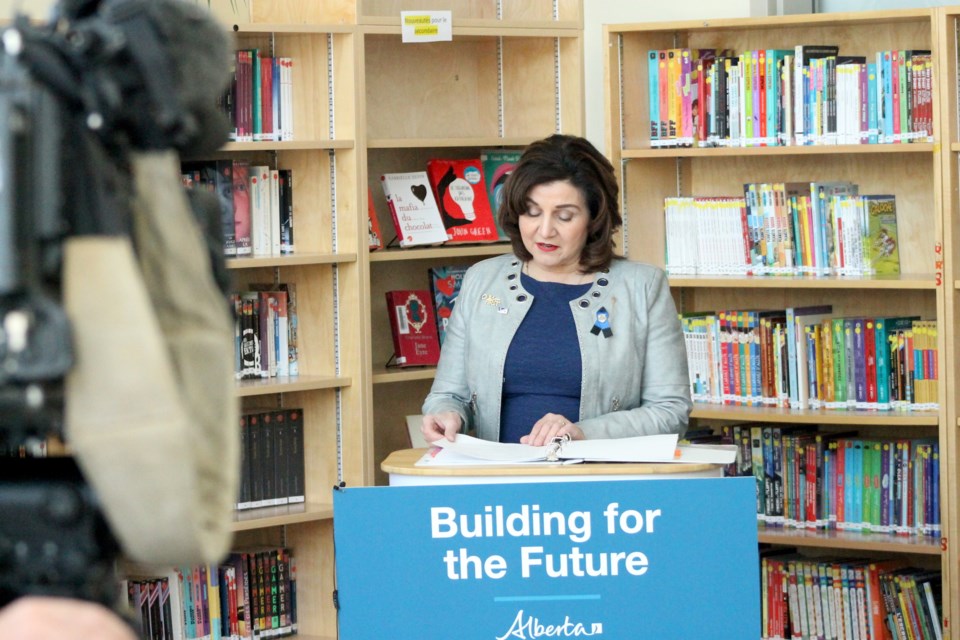Alberta Education Minister Adriana LaGrange was in Airdrie alongside members of Le Conseil scolaire FrancoSud on March 23 to formally announce the future construction of a Francophone high school in the city, after funding was allocated toward the project in the provincial government's recent capital budget.
Speaking at a press event at l'École francophone d'Airdrie in Ravenswood on Thursday morning, LaGrange said she was pleased to be in Airdrie on behalf of the provincial government in confirming the impending capital project, which once completed, will be the city's second Francophone school.
“Today we are here to celebrate the French language and diverse Francophone cultures,” she said during her address. “A big ‘Merci’ to the students and staff here at École francophone d’Airdrie, and Principal Nicolas Emond for hosting us today.”
The education minister cited a growth in French-speaking populations in Alberta in recent years, including the Airdrie region, as justification for the need for a second school.
“Our province has one of the fastest growing French-speaking populations in Canada,” LaGrange said. “There has been a 45 per cent increase in Francophone education enrolment in the past 10 years. Alberta’s Francophone communities continue to grow, so we must ensure our Francophone partners have the resources necessary to be able to welcome and support the learning needs of new Alberta Francophone families and students.”
A high-school for Airdrie was listed as the number-one capital project priority on the southern Alberta Francophone school division's most recent four-year capital priorities plan. (The Francophone school division is commonly referred to as 'FrancoSud'). The division's board chair, Marco Bergeron said a high school will help ease space pressures at Airdrie's current sole Francophone school, which is approaching a 100 per cent utilization rate.
“With this new high school, our students will benefit from, facilitate and carry out technological studies, science, fine arts, music, and sports, among other things,” Bergeron said on Thursday.
“But that’s not all. It will also provide them with a real high-school experience – a place [they can call] their own, where they can connect, socialize, and learn with their peers in a stimulating Francophone environment.”
According to LaGrange and Bergeron, the future school will house students in grades 7 to 12. Bergeron said until the new school is built, École francophone d'Airdrie will continue to offer classes from kindergarten to Grade 12. Once the new school is operational, he added the Ravenswood school would transition to being a K-6 school.
While the timeline for construction is yet-to-be-determined, LaGrange said the average length of time for a new school to be built is between two and three years once construction has commenced.
“There’s much to do, but typically, from the time it’s announced to the time it’s built, depending on if there’s no delays, it can be anywhere from 24 to 36 months,” she said.
Arsenic in Reunion
While the neighbourhood of Reunion was not cited during the March 23 event, representatives from FrancoSud had confirmed earlier the new high school is slated to be built in that northwest Airdrie community.
In the division's capital priorities plan document, FrancoSud cited a higher-than-average concentration of arsenic in the soil at the future school site in Reunion as a potential impediment to construction progress.
But on Thursday, reps from the school board said the chemical's presence shouldn't delay construction. Stéphan De Loof, the executive director of operations, transportation, and infrastructure for FrancoSud told the Airdrie City View the arsenic in Reunion is naturally occurring, and the concentration is far from high enough to pose any concerns.
“What [naturally occurring] means is, it wasn’t done from dumping or anything,” he said. “It’s just the way it is on that side of town. There already is a school in Reunion. What happened is, between the school that was already built and afterward…[the province] changed the environmental standard for arsenic in the ground. That’s why there was a bit of a problem with the site in Reunion.”
De Loof added FrancoSud has worked with Alberta Environment, Health, and Infrastructure officials over the years, studied the soil in Reunion, and have been given the all-clear by those provincial authorities. He said arsenic usually only proposes a problem when it infiltrates water, and in the case of the future Francophone school in Airdrie, there's no substantial body of water at the site.
“Arsenic would be a problem if it infiltrated water, but because it’s just a building, we’ll just do the right remediation wherever we drill,” he said. “The stuff that is there will go somewhere else and be treated. It doesn’t create any problem. In order to get sick from arsenic, you’d have to eat a really big amount of dirt, so it’s not a problem.”



